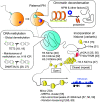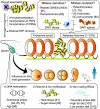Epigenetic modifications and reprogramming in paternal pronucleus: sperm, preimplantation embryo, and beyond
- PMID: 28050628
- PMCID: PMC11107594
- DOI: 10.1007/s00018-016-2447-z
Epigenetic modifications and reprogramming in paternal pronucleus: sperm, preimplantation embryo, and beyond
Abstract
Pronuclear/zygotic stage is the very first stage of life. In this period, paternal pronucleus undergoes massive chromatin remodeling called "paternal reprogramming" including protamine-histone replacement and subsequent acquisition of epigenetic modifications. Although these consecutive events are required for the initiation of maternal-zygotic transition, the precise role of paternal reprogramming and its effect on subsequent embryonic development has been largely unknown to date. Recently, various new techniques, especially next-generation sequencing (NGS) and RNAi microinjection contribute to unveil the epigenetic transition from both paternal and maternal to early preimplantation embryos, suggesting not only the simple transcriptional regulation by transcription factors but also dynamic structural alteration of chromatin to initiate the wave of zygotic gene transcription. This review summarizes such recent progress for understanding the epigenetic transition in sperm and preimplantation embryos, and further argue about its transgenerational effect.
Keywords: Epigenetic modification; Fertilization; Histone; Preimplantation development; Pronucleus; Protamine; Transgenerational epigenetic inheritance; Zygotic gene activation.
Figures


Similar articles
-
Epigenetic reprogramming of the zygote in mice and men: on your marks, get set, go!Reproduction. 2016 Dec;152(6):R211-R222. doi: 10.1530/REP-16-0376. Epub 2016 Sep 6. Reproduction. 2016. PMID: 27601712 Free PMC article. Review.
-
GSE is a maternal factor involved in active DNA demethylation in zygotes.PLoS One. 2013;8(4):e60205. doi: 10.1371/journal.pone.0060205. Epub 2013 Apr 1. PLoS One. 2013. PMID: 23560077 Free PMC article.
-
Histone variant H3.3-mediated chromatin remodeling is essential for paternal genome activation in mouse preimplantation embryos.J Biol Chem. 2018 Mar 9;293(10):3829-3838. doi: 10.1074/jbc.RA117.001150. Epub 2018 Jan 22. J Biol Chem. 2018. PMID: 29358330 Free PMC article.
-
Histone modifications at the blastocyst Axin1(Fu) locus mark the heritability of in vitro culture-induced epigenetic alterations in mice.Biol Reprod. 2010 Nov;83(5):720-7. doi: 10.1095/biolreprod.110.084715. Epub 2010 Jul 21. Biol Reprod. 2010. PMID: 20650886
-
Epigenetic reprogramming in the transition from pluripotency to totipotency.J Cell Physiol. 2024 May;239(5):e31222. doi: 10.1002/jcp.31222. Epub 2024 Feb 20. J Cell Physiol. 2024. PMID: 38375873 Review.
Cited by
-
Ezh2 Is Essential for Patterning of Multiple Musculoskeletal Tissues but Dispensable for Tendon Differentiation.Stem Cells Dev. 2021 Jun 1;30(11):601-609. doi: 10.1089/scd.2020.0209. Epub 2021 Apr 27. Stem Cells Dev. 2021. PMID: 33757300 Free PMC article.
-
Dynamic nucleosome organization after fertilization reveals regulatory factors for mouse zygotic genome activation.Cell Res. 2022 Sep;32(9):801-813. doi: 10.1038/s41422-022-00652-8. Epub 2022 Apr 15. Cell Res. 2022. PMID: 35428874 Free PMC article.
-
Distinct role of histone chaperone Asf1a and Asf1b during fertilization and pre-implantation embryonic development in mice.Epigenetics Chromatin. 2021 Dec 14;14(1):55. doi: 10.1186/s13072-021-00430-7. Epigenetics Chromatin. 2021. PMID: 34906203 Free PMC article.
-
Short-interval second ejaculation improves sperm quality, blastocyst formation in oligoasthenozoospermic males in ICSI cycles: a time-lapse sibling oocytes study.Front Endocrinol (Lausanne). 2023 Sep 7;14:1250663. doi: 10.3389/fendo.2023.1250663. eCollection 2023. Front Endocrinol (Lausanne). 2023. PMID: 37745695 Free PMC article.
-
Symmetrically dimethylated histone H3R2 promotes global transcription during minor zygotic genome activation in mouse pronuclei.Sci Rep. 2021 May 12;11(1):10146. doi: 10.1038/s41598-021-89334-w. Sci Rep. 2021. PMID: 33980975 Free PMC article.
References
-
- Kimura Y, Yanagimachi R. Mouse oocytes injected with testicular spermatozoa or round spermatids can develop into normal offspring. Development. 1995;121(8):2397–2405. - PubMed
-
- Teperek M, Simeone A, Gaggioli V, Miyamoto K, Allen GE, Erkek S, Kwon T, Marcotte EM, Zegerman P, Bradshaw CR, Peters AH, Gurdon JB, Jullien J. Sperm is epigenetically programmed to regulate gene transcription in embryos. Genome Res. 2016;26(8):1034–1046. doi: 10.1101/gr.201541.115. - DOI - PMC - PubMed
Publication types
MeSH terms
LinkOut - more resources
Full Text Sources
Other Literature Sources

